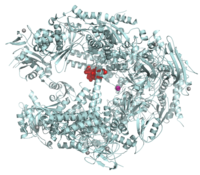
Photo from wikipedia
The purpose of this study was to ascertain the effect of selenium-chondroitin sulfate nanoparticles (CS@Se) on multi-target-directed therapy for the treatment of Alzheimer's disease (AD). CS@Se nanoparticles were successfully synthesized,… Click to show full abstract
The purpose of this study was to ascertain the effect of selenium-chondroitin sulfate nanoparticles (CS@Se) on multi-target-directed therapy for the treatment of Alzheimer's disease (AD). CS@Se nanoparticles were successfully synthesized, and their therapeutic effects were studied in in vitro AD models. CS@Se effectively inhibited amyloid-β (Aβ) aggregation and protected SH-SY5Y cells from Aβ1-42-induced cytotoxicity. Moreover, CS@Se significantly decreased okadaic acid-induced actin cytoskeleton instability in SH-SY5Y cells. In addition, CS@Se decreased the levels of reactive oxygen species (ROS) and malondialdehyde (MDA) and increased the levels of glutathione peroxidase (GSH-Px). The Western blot results indicated that CS@Se attenuated the hyperphosphorylation of tau (Ser396/Ser404) by regulating the expression of GSK-3β. In summary, this study demonstrated that CS@Se could inhibit the aggregation of Aβ, reduce damage to the cytoskeleton, mitigate oxidative stress and attenuate the hyperphosphorylation of tau protein. CS@Se might be a potent multi-functional agent for the treatment of AD and thus warrants further research and evaluation.
Journal Title: International journal of biological macromolecules
Year Published: 2019
Link to full text (if available)
Share on Social Media: Sign Up to like & get
recommendations!